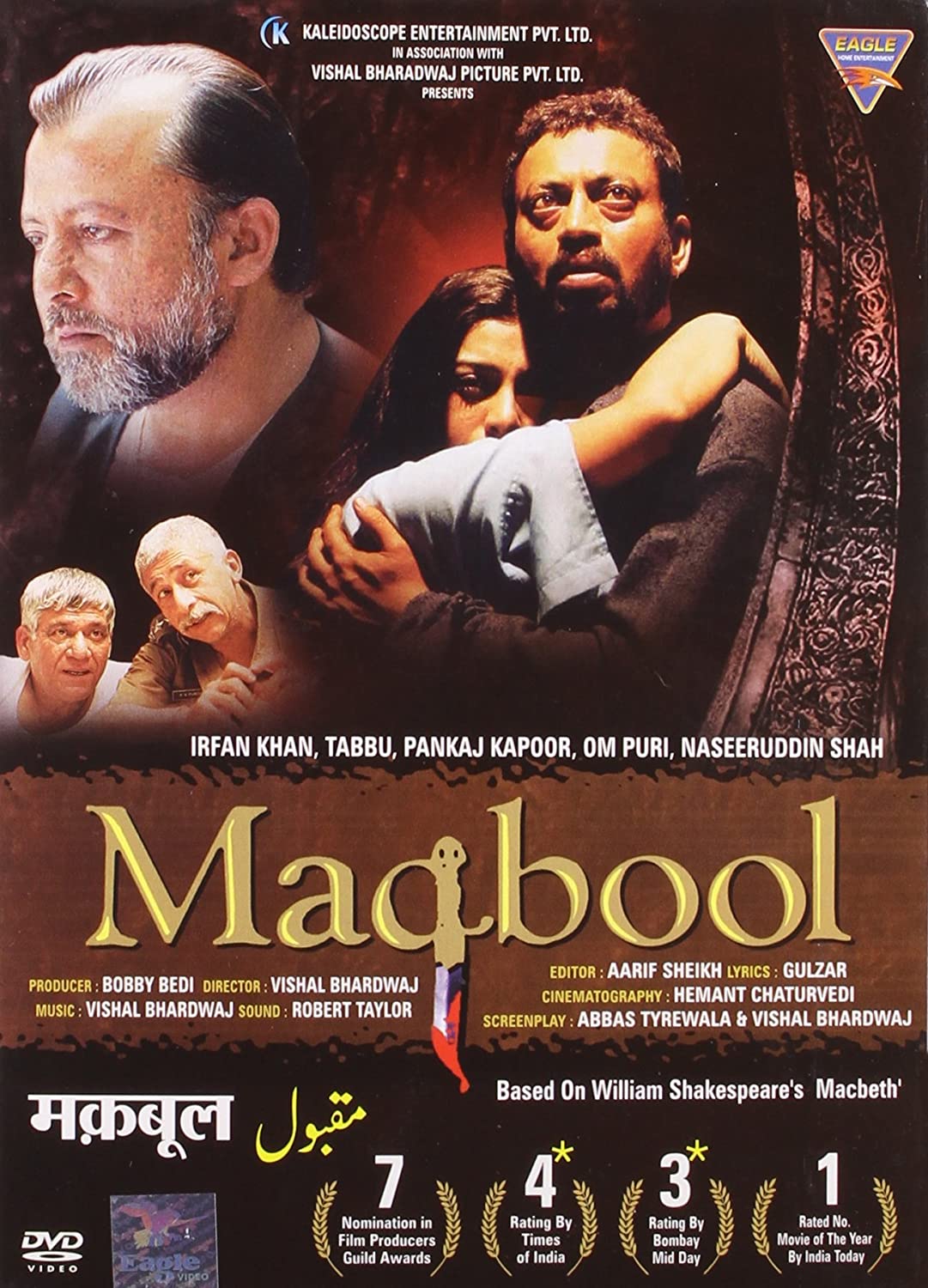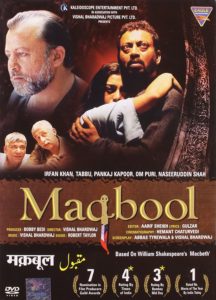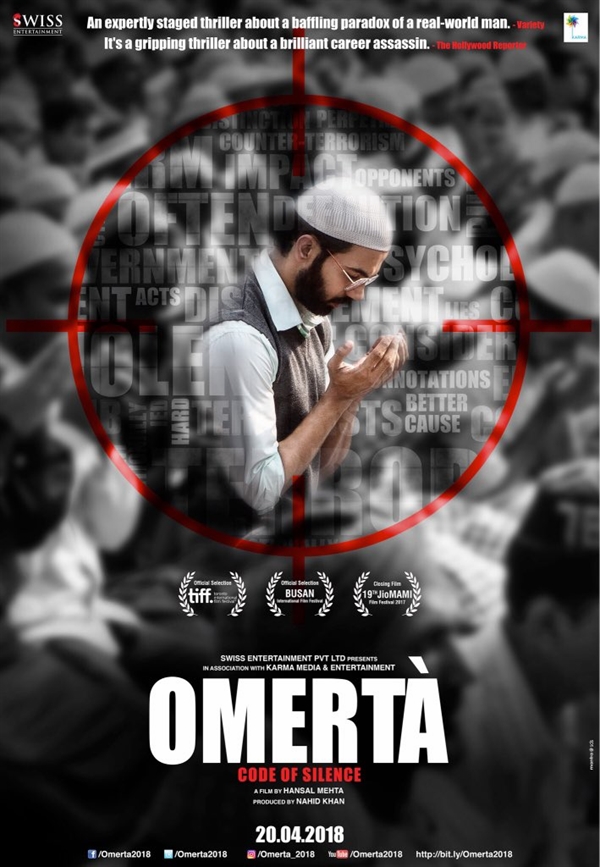
Bollywood Redux Film Review “Maqbool”
NO TRAILER CURRENTLY AVAILABLE
First, the Recap:
Affairs of the heart. It would appear that regardless of what realms in our reality they occur, said affairs would seem to carry pure, absolute joy or devastatingly crushing hurt. How much more might either actuality be present when it is all birthed in a world of criminality? Maqbool (Irrfan Khan) is the strong and intimidating right hand of crime boss Jahangir Khan (Pankaj Kapur). Living to see the competition, or any who cross the organization, receive the messages that aid in Jahangir maintaining power, Maqbool’s aspirations begin to shift as others persuade him to make a bold move to take over. Complicating things is his love for Nimmi (Tabu), Jahangir’s mistress. As Maqbool starts upon a path of no return, however, events then unfold that will alter his entire plan to continue an empire as enemies amass and his own tainted but true heart threaten to undermine everything and lead to nothing but tragedy.
Next, my Mind:
Visionary. Legendary. These are terms that should not be thrown around lightly or callously when utilized to describe the magnitude of accomplishment and ongoing aptitude of a filmmaker. Here, the words are unerringly assigned to Bollywood auteur and undeniably multi-talented artist Vishal Bhardwaj, a deeply respected and well-known veteran of the South Asian industry whose efforts go well beyond the 14 films he’s helmed (including the upcoming “Khufiya“) like this review’s project, “Omkara“, “Rangoon“, and “Haider” but spans into the other primary talent he possesses–composer. Having scored 60 films and TV shows during his continuing career, it is this kind of creative genius and ability that more than needs to be spread beyond its Bollywood borders, especially here in the U.S., as Bhardwaj has definitely earned the right to be recognized through a wider audience and allowed to showcase just how exceptional South Asian cinema is in a world so often fueled by Hollywood as “the standard”.
Power struggles, deception, murder, subversive planning, shifting alliances, blatant treachery, forbidden love, haunting visions, madness, and a descent into circumstances spinning out of control all find their foundational presence within the world of overt criminality via this feature film from writer/director/co-producer/composer Bhardwaj, writer Abbas Tyrewala, producer Bobby Bedi, co-producer Rekha Bhardwaj, and executive producer Laurens C. Postma that takes the literally classic “Macbeth” by the legendary and highly prolific playwright William Shakespeare and immerses it into a more contemporary era and puts its tragic narrative in the context of a mob family and their activities. This is by FAR not the first time this tactic has been employed and executed on the big screen, as adaptations/interpretations of these works are legion. However, leave it to Bollywood cinema to still manage to find a way to take this oft portrayed tale and keep it fresh enough to remain engaging.
Here, we follow a modern equivalent of Macbeth via turning him into the primary hit man for a violently lucrative crime family whose rivals are few yet closing in and the organization’s inner workings are filled with proverbial foxes in the hen house, whispering lies, enacting self-serving ambitions, and sowing the seeds of hostile takeover in his mind. Likewise exploring the illicit love between him and his boss’ mistress, the story follows the cornerstone thematic concepts the play is known for with a deft touch and healthy doses of all the aforementioned elements so as to remain true to the original vision Shakespeare had for this story. It’s assuredly a lesson in deeply poor decisions being made without entirely considering their consequences not only to oneself, but to all those around you whom you might actually care for. Granted in this kind of company, those who one might actually care for could be few and far between with the levels of real trust between people constantly in question, but still.
Yet, even if knowing something will potentially lead to tragedy, it also speaks to our human stubbornness for pursuing that which is, or should be, denied to us, hence making us want it more. Loyalty, trust, betrayal, deceit, and twisted aspirations tend to drag us down a road of utter destruction and yet we still allow our own conscious and moral code to be compromised, our compass skewed, and our sense of self tainted if it means gaining that which we believe is best for us. Now, mind you, I am not remotely saying that how this is all laid out in the film reflects our personal experiences (honestly, I hope not!), but do these overall general ideas, even in principle, not somehow, some way, in some form echo in our hearts and souls at some point when what we desire is on the table and being offered. I feel that’s what makes so many of Shakespeare’s narratives so unsettling at times because they speak so acutely to human nature, often the ugly side of it, and it’s a dark reality not easy to face. The film does project all of this beautifully and dramatically. Anyone who’s familiar with the story knows already how it all ends, so the finale in itself is completely expected and non-shocking, but still packs the intended punch given all we’ve seen to that point.
As I was recently stating in my review of “The Lunchbox”, there is no getting past the absolute magic and potently striking performances that the recently passed Irfaan Khan brings to the roles and characters he plays, and leave it to him to yet again prove why he was undeniably one of THE greatest character actors in cinema through this role as Maqbool, a hardened and deadly serious hitman for a mob family in the midst of success, but also looming troubles both outside and inside the organization. Maqbool does his level best to serve his boss, but has his own ideas and wants, including the boss’ mistress, and soon, events begin to unfold that see him making a play for it all. Even after, when things would seem to have a possibility of settling down, it instead ushers in a slow but guaranteed ascent into escalating situations that tear away at every facet of the business and life, but also his very sanity. It’s actually a very stripped down, emotionally raw performance Kahn delivers, and it is done as only his fully relatable poise, focus, sheer acting skill, and level of intensity could bring.
Primary supporting roles arrive here through the always radiant Tabu as Nimmi, Jahangir’s mistress and the actual love interest of Maqbool who sometimes exceedingly offers her fair share of drama into the already volatile mix that they find themselves becoming more and more embroiled in. Her insistence on pursuing him promises both love and misery, slowly poisoning Maqbool’s mind, and watching how this unfolds is excellently portrayed by the veteran actress, delivering it with her beauty, grace, balanced acting, and emotive adeptness. Kapur is so perfectly cast to play crime lord Jahangir, a rarely smiling, all-business, stone-faced mob magnate who has done all he can to see the family profit and rise to the top. But, even as his supposed stranglehold on everything begins to show weaknesses, the vultures are circling and his hard-handed, merciless reign might be seeing its twilight. Throughout the screen time he has, Kapur is such a strong, commanding presence as Jahangir, and he totally draws you in as that “character you love to hate”.
Two more gems of South Asian cinema continue this film’s epic line-up, Naseeruddin Shah and, sadly, the late (You are missed!!) Om Puri as two corrupt police officers Inspector Purohit and Inspector Pandit who make themselves quite at home at Jahangir’s home (and at his expense) in order for the boss to keep them in the know and making needed arrangements when specific run-ins with the law are in play against the family. Yet, they also have their own agendas and how they play into it all is fantastically illustrated as the film progresses, with both actors showcasing why they are two of the best. Piyush Mishra brings an intentionally frantic and wonderfully presented performance as one of Jahangir’s top lieutenants Kaka, whose son Guddu (Ajay Gehi) is making a play for Jahangir’s daughter Sameera (Masumeh Makhija). How all three of their paths intertwine and play into the events is affecting and candidly brutal on several fronts, with all three actors firmly enacting their roles with full passion and purpose.
Other key supporting roles are present and acted with superb levels of apropos gravitas as the story demands via Manav Kaushik, Ankur Vikal, Murali Sharma, Firdous Irani, Vivek Mushran, and Shammi Narang among a large host of other appearances. So, in total, “Maqbool” not only faithfully adapts the well-known tale for a more modern audience, but does so in a manner that allows a freshness to it rather than feeling like a retread of other efforts that have done similar things. It stands as one of the most cautionary tales of loyalty dying, clandestine yearning’s destructive power, and the ramifications of flying too high on ill-gotten wings. Truthfully, these are lessons this world could use some awareness of and certainly could benefit from so humanity’s story doesn’t have to be one ending in tragedy.
As always, this is all for your consideration and comment. Until next time, thank you for reading!






Permalink